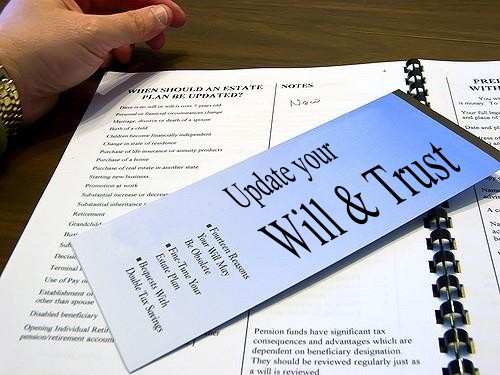
In simple terms, a will is a written document—signed and witnessed—that indicates how your property will be distributed at your death. It is revocable and subject to amendment during your lifetime. It also allows you to appoint a guardian for your minor children.
A will, more technically defined, is a “writing” in which a grantor (creator of the will) expresses terms which should take effect during his or her death. Under Maryland Law, a valid will must be signed by the grantor (or someone acting in the grantor’s presence and on his or her behalf) and must be attested to and signed by two or more credible witnesses.
A key aspect of a will is that it does not take effect until the grantor dies. A will creates an estate which distributes property known as probate assets and appoints a Personal Representative to do so. The Personal Representative then goes through Probate Court to ensure that the probate assets are distributed consistent with the Will.
Absent a Will, probate assets are distributed by a Probate Court through “intestate succession” – laws which distributes these assets to your family in a particular order. Also, a Will can contain critical information regarding your health decisions, and care of your children or pets after your death.
The first and most essential step in an estate plan is drafting a will. If there is no written, or verified expression of your wishes should death occur, then state law will decide what becomes of your legacy. Our team believes that every individual’s story and circumstances are unique. You have concerns and preferences which should be protected after you pass away. Here is a small sampling of the myriad of subjects your will can address:

There are an innumerable number of good reasons to have a will. Even if you have a will, many common life events will require you to amend your current will. As our founding attorney, Gary Altman, often says, “Having an outdated will can be as risky as having no will at all.” Here a just a few reasons to consider having your will amended or redrafted:
A will and a trust might look similar and have similar terms, however, they are functionally very different documents which, ideally, can work together for your benefit. While a will determines how your assets will be distributed after you die, a trust becomes the legal owner of your assets the moment the trust is created. There are numerous trusts, but an irrevocable trust is most relevant in the world of personal estate planning. As the name implies, an irrevocable trust cannot be revoked once it is created; if you put property in the trust, you cannot take it out. This is ideal for people who want to avoid probate and keep the details of their estates private. (Wills are public record in most States.) An irrevocable trust also allows you to make more detailed provisions regarding your estate and offers you protection from creditors or potential litigants. Learn more about Trusts here.
The death of a loved one is hard enough. Having to challenge a will you believe is unfair or invalid, or defend your interests against a will contest, can exacerbate the loss, and make the healing process even more difficult. Knowing you have a team in your corner committed to your claim can make all the difference. The Maryland wills and estates attorneys at Altman and Associates have a reputation of providing individualized, caring representation to every client, no matter how challenging the circumstances.
In Maryland, you must meet requirements to challenge a will. A challenger, known as the “caveator,” must demonstrate their connection to the estate to establish standing. A caveator can do this in two ways. The caveator must either be named as a beneficiary in the contested will, or, if they are not named in the will as a beneficiary, show they would have inherited under statutory law if the loved one had died without a will.
The caveator must also have grounds for contesting a will, beyond simply believing that the will is unfair. In Maryland, there are several grounds for contesting a will, including:
Revoking or amending a will is relatively easy and may be done. Maryland law, for example, lists several ways to revoke a will. This includes such extreme measures as tearing or burning a will, but it is advisable to keep a copy of the revoked will. In some states, a will which includes a former spouse is revoked once a divorce is final.
We know how important it is that your loved one’s wishes be carried out exactly as they intended. At Altman and Associates, we understand that will contests are a serious, delicate matter for you and your family. We have experience working with people from all backgrounds, including high-to-middle income estates, blended families, same-sex partners, and business owners. We bring our personalized, compassionate approach to each client’s situation. Call us at 301-468-3220 or contact us online to schedule a consultation. We provide legal advice conveyed with Integrity, Honesty, Experience, and Professionalism.